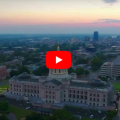 Yesterday the 2015 Arkansas Poll from the University of Arkansas was released. Many are seizing on some of the data contained in the poll, saying the poll shows Arkansans now support the legalization of so-called “medical” marijuana. But not so fast. Let’s take a look at what the poll actually says–and at the marijuana proposal vying for a spot on the ballot.
Yesterday the 2015 Arkansas Poll from the University of Arkansas was released. Many are seizing on some of the data contained in the poll, saying the poll shows Arkansans now support the legalization of so-called “medical” marijuana. But not so fast. Let’s take a look at what the poll actually says–and at the marijuana proposal vying for a spot on the ballot.
Pollsters surveyed 800 Arkansans by telephone. Among other things, they asked survey respondents, “Do you favor allowing patients to use marijuana for medical purposes if supported by their medical doctor?”
The poll question is very simple and narrowly-tailored. However, the “medical” marijuana proposals being offered in Arkansas are much broader. Here is what we mean:
In 2012 only 43% of survey respondents told the University of Arkansas they supported the “medical” marijuana proposal by Arkansans for Compassionate Care. Today, according to this poll, 68% of likely voters say a patient ought to be able to use marijuana if supported by their doctor.
The poll numbers are different because these are two completely different poll questions. The 2012 proposal did more than simply let people use marijuana; it established marijuana stores throughout Arkansas; it allowed patients and caregivers to grow marijuana at home; and it restricted the ability of local communities to regulate marijuana sales and use.
The 2016 proposal Arkansans for Compassionate Care is trying to place on the ballot contains the very same provisions. The new proposal:
- Establishes stores where marijuana will be sold;
- Allows people to grow marijuana at home;
- Restricts the ability of local communities to regulate marijuana use and sales.
Marijuana Stores
The 2016 proposal calls the marijuana stores it establishes “Nonprofit Cannabis Care Centers.” That sounds innocent enough, but there’s a problem: These “nonprofits” are not charities; they do not file with the IRS for nonprofit status. They are “nonprofit” in the sense that they do not pay dividends to corporate shareholders.
Believe it or not, up until this year the National Football League was a nonprofit organization. No one would doubt professional football is an incredibly lucrative business, but the NFL was–technically–a nonprofit organization. How was that even possible? Largely because the NFL did not have shareholders to whom it paid dividends. That is the basic definition of a “nonprofit” organization.
These “Nonprofit Cannabis Care Centers” are not charities. They don’t have to file for tax-exempt status or get their funding from charitable donations. They are going to sell marijuana, and the people running them are going to make a lot of money, plain and simple.
Homegrown Marijuana
The 2012 proposal allowed any “qualifying patient” who lived more than a certain distance from a marijuana store to grow and use marijuana at home. So does the 2016 proposal.
Section 106 of the new proposal lets anyone who lives more than 20 miles from a marijuana store grow and use marijuana at home. The proposal requires them to file some paperwork with the Department of Health as a formality, but it makes it very clear: People can grow their own “medical” marijuana under this proposal.
Loss of Local Control
If the 2016 proposal by Arkansans for Compassionate Care passes, Arkansas law will change, but marijuana cultivation, possession, sale, and use still will be a federal crime. Do you think cities and counties might want to regulate local activity that violates federal laws? But they can’t under this proposal.
Section 114 of the proposal lets cities and counties limit “the number of Nonprofit Cannabis Care Centers [i.e. marijuana stores]” in the community and enact “reasonable zoning regulations” applicable to the marijuana stores.
Cities and counties can’t stop people from growing marijuana in violation of federal law; they can’t stop people from using marijuana in violation of federal law; the only thing they can do is tax and regulate the marijuana stores to a limited extent.
This puts cities and counties in a bind. Even if they can somehow zone and regulate marijuana stores out of the community, marijuana users will simply grow and use marijuana at home under Section 106 of the proposal. The city council’s or quorum court’s choices are either allow stores to sell an illegal drug in the community, or let people grow and use that illegal drug at home. That’s a huge loss of local control.
The Poll Question Has Nothing to Do With the Marijuana Proposals Up for Consideration
What the Arkansas Poll shows us is simple: Right or wrong, many Arkansans think a patient ought to be able to use “medical” marijuana if their medical doctor supports the decision.
Sixty-eight percent of likely voters might approve simply letting a sick person use marijuana if their doctor agrees. However, far fewer Arkansans support letting people grow marijuana at home; opening marijuana stores in their communities; and stripping local governments of the ability to regulate marijuana cultivation, sale, and use in any meaningful sense.
The most important poll taken on this issue occurred in 2012. Arkansans rejected marijuana at the ballot box then. This latest poll is so narrow that it fails to prove they would vote any differently today.


